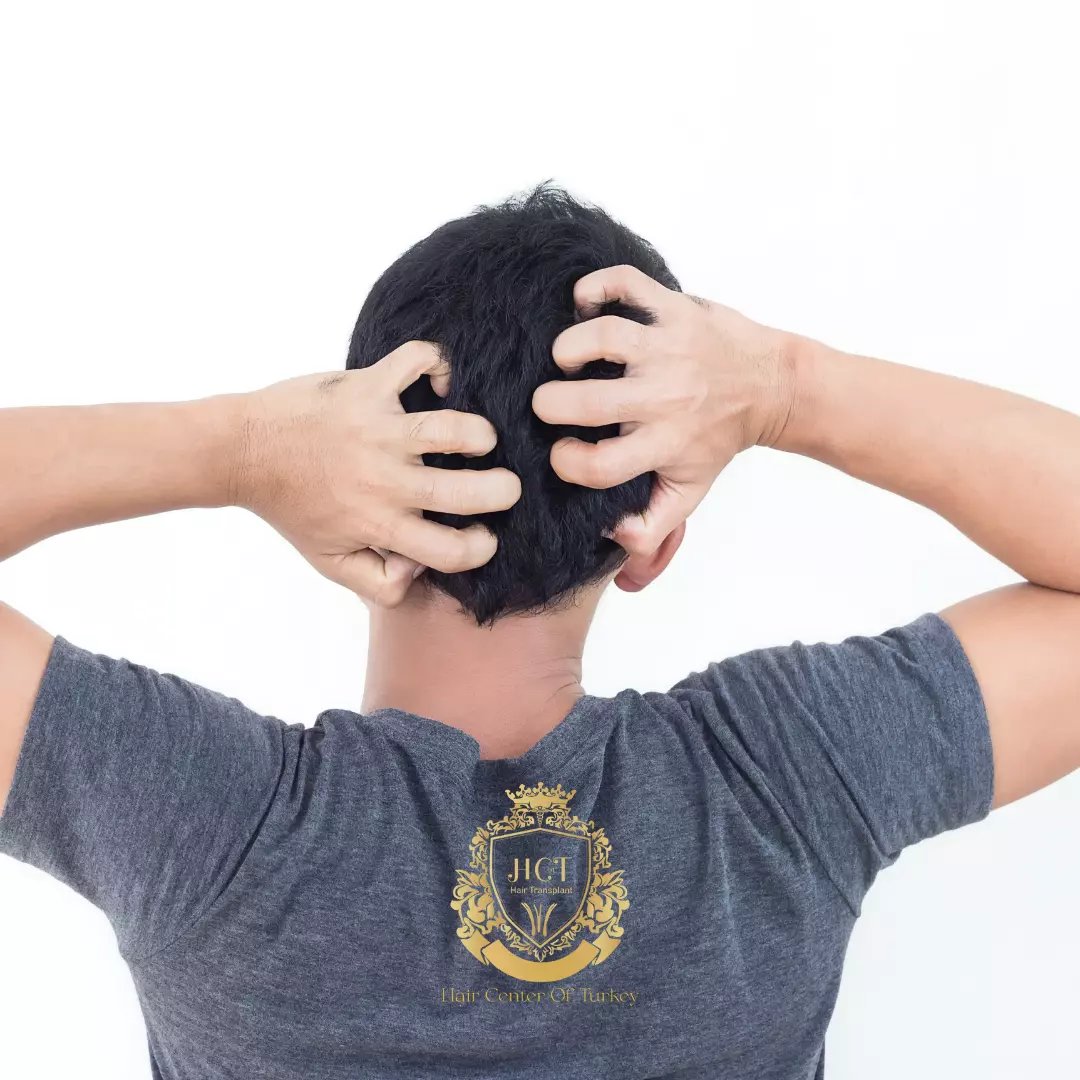
Juckende Kopfhaut beruhigen: Was hilft?
Die meisten juckenden Kopfhautprobleme bessern sich, wenn man auf ein mildes, parfümfreies Shampoo umsteigt, lauwarmes Wasser zum Waschen verwendet und die Kopfhaut mit Feuchtigkeit versorgt. Schuppung mit Rötung kann auf Schuppen oder Dermatitis hinweisen und erfordert möglicherweise ein medizinisches Shampoo. Suchen Sie ärztliche Hilfe auf, wenn nässende Stellen, Schmerzen, fleckiger Haarausfall oder Juckreiz auftreten, der länger als zwei Wochen anhält.
Inhaltsverzeichnis
Ursachen für juckende Kopfhaut
Juckreiz auf der Kopfhaut ist häufig und meist mit Trockenheit, Reizung oder einer Kopfhauterkrankung wie Schuppen verbunden. Die beste Behandlung hängt davon ab, ob zusätzlich Schuppen, Rötungen, Beulen oder Haarausfall auftreten. Dies sind die häufigsten Ursachen.

Trockene Kopfhaut
Trockenheit äußert sich oft durch Spannungsgefühle, feine Schuppenbildung und Juckreiz, der sich bei kaltem Wetter oder häufigem Waschen verschlimmert. Heiße Duschen, Heizungsluft und aggressive Reinigungsmittel können die schützenden Öle von der Kopfhaut entfernen.
Haarprodukte und chemische Reizstoffe
Duftstoffe, Farbstoffe, Konservierungsmittel und starke Reinigungsmittel können die Kopfhaut reizen oder eine allergische Kontaktdermatitis auslösen. Symptome können Brennen, Rötung, Schuppung entlang des Haaransatzes oder Juckreiz sein, der nach der Verwendung neuer Produkte auftritt.
Schuppen (Seborrhoisches Ekzem)
Schuppen verursachen meist fettige oder weiße Schuppen mit Juckreiz und leichter Rötung. Sie können durch Stress, jahreszeitliche Veränderungen oder durch Rückstände fettiger Produkte auf der Kopfhaut verstärkt werden.
Ekzem oder Psoriasis
Atopische Dermatitis (Ekzem) kann trockene, juckende Stellen verursachen, während Psoriasis häufig dickere, silbrig-schuppende und klar begrenzte Plaques bildet. Beide Erkrankungen können die Kopfhaut betreffen und erfordern eventuell eine gezielte Behandlung durch eine Fachkraft.
Infektionen
Pilzinfektionen können Juckreiz, Schuppenbildung und manchmal abgebrochene Haare oder empfindliche Stellen verursachen. Bakterielle Follikulitis kann sich als juckende oder schmerzhafte Beulen oder Pusteln zeigen.
Kopfläuse
Läuse verursachen starken Juckreiz und können vermutet werden, wenn Nissen (Eier) an den Haarschäften, besonders hinter den Ohren und im Nackenbereich, sichtbar sind. Enge Kontaktpersonen können ebenfalls Juckreiz entwickeln.
Behandlungen und Verfahren gegen Haarausfall
Behandlungen wie Haartransplantationen, Microneedling oder topische Medikamente können während der Heilung vorübergehend Juckreiz verursachen. Kratzen oder das Entfernen von Krusten kann die Heilung verzögern und das Infektionsrisiko erhöhen.
Stress und Angst
Stress kann viele Hauterkrankungen verschlimmern und das Juckempfinden verstärken. Wenn der Juckreiz mit Stressphasen zusammenhängt, kann die Verbesserung von Schlaf- und Stressgewohnheiten andere Behandlungen unterstützen.
Was hilft bei juckender Kopfhaut
Beginnen Sie mit einer sanften Pflege und passen Sie die Behandlung an Ihre Symptome an. Wenn Sie eine bekannte Hauterkrankung haben oder kürzlich ein Kopfhautverfahren durchgeführt wurde, folgen Sie zunächst den Empfehlungen Ihrer Ärztin oder Ihres Arztes.
Sanfte tägliche Pflege
- Mit lauwarmem Wasser waschen und lange, heiße Duschen vermeiden.
- Ein mildes, parfümfreies Shampoo verwenden und gründlich ausspülen.
- Kratzen vermeiden. Wenn Linderung nötig ist, leicht mit den Fingerspitzen drücken statt mit den Nägeln zu kratzen.
- Bei starkem Juckreiz ein kühles Kompress für 5–10 Minuten anwenden.
Bei Schuppen oder “Dandruff”
Ein medizinisches Anti-Schuppen-Shampoo kann Juckreiz und Schuppen reduzieren, wenn es regelmäßig angewendet wird. Häufige Wirkstoffe sind Ketoconazol, Selensulfid, Zinkpyrithion, Salicylsäure oder Steinkohleteer. Befolgen Sie die Anwendungshinweise und geben Sie dem Produkt ein paar Wochen Zeit zur Wirkung.
Wenn sich die Kopfhaut trocken oder gespannt anfühlt
- Waschfrequenz reduzieren, falls Sie täglich waschen.
- Alkoholhaltige Stylingprodukte und starke Trockenshampoos vermeiden.
- Eine leichte, kopfhautfreundliche Feuchtigkeitspflege oder ein Öl sparsam direkt auf die Haut (nicht nur auf das Haar) auftragen.
Wenn Sie eine Produktunverträglichkeit vermuten
Beenden Sie die Verwendung neuer Produkte und vereinfachen Sie Ihre Pflegeroutine für 1–2 Wochen. Wählen Sie parfümfreie Produkte und vermeiden Sie Haarfärbemittel oder chemische Behandlungen, bis sich die Symptome bessern. Bei Ausschlag oder Schwellungen ärztlichen Rat einholen.
Nach einer Haartransplantation oder einem Kopfhautverfahren
Leichter Juckreiz ist während der Heilung normal, doch die Kopfhaut ist in dieser Zeit empfindlicher. Halten Sie sich an Ihren Nachsorgeplan und verwenden Sie keine neuen Produkte, es sei denn, Ihre Klinik hat diese genehmigt.
- Nicht kratzen, reiben oder an Krusten zupfen. Dies kann Transplantate stören und die Heilung verzögern.
- Nur die von Ihrem medizinischen Team empfohlenen Reinigungsmittel, Sprays und Lotionen verwenden.
- Wenden Sie sich umgehend an Ihre Klinik, wenn Sie zunehmende Rötung, Wärme, Schwellung, Ausfluss oder Fieber bemerken.
Wann Sie einen Arzt aufsuchen sollten
Holen Sie sich ärztlichen Rat, wenn der Juckreiz stark ist, immer wiederkehrt oder sich durch grundlegende Pflege nicht bessert. Bei folgenden Symptomen sofort medizinische Hilfe suchen:
- Schmerzen, Nässen, Verkrustung oder unangenehmer Geruch auf der Kopfhaut
- Sich rasch ausbreitende Rötung, Schwellung oder Fieber
- Fleckiger Haarausfall, abgebrochene Haare oder geschwollene, schmerzhafte Lymphknoten
- Anhaltender Juckreiz über mehr als zwei Wochen trotz sanfter Pflege
- Hinweise auf Läuse oder eine ansteckende Kopfhauterkrankung im Haushalt
Vorbeugungstipps
- Halten Sie Ihre Pflegeroutine einfach und vermeiden Sie häufige Produktwechsel.
- Testen Sie neue Produkte möglichst vorab – insbesondere Haarfarben und parfümierte Artikel.
- Spülen Sie Schweiß und Stylingprodukte nach dem Training gründlich aus.
- Behandeln Sie Schuppen frühzeitig mit einem Anti-Schuppen-Shampoo ein paar Mal pro Woche, wenn Sie zu Ausbrüchen neigen.
- Achten Sie auf ausreichend Schlaf und Stressbewältigung, wenn Ihre Symptome stressbedingt auftreten.
FAQ
Warum juckt meine Kopfhaut unerträglich?
Häufige Ursachen sind Schuppen, trockene Haut, Ekzem/Psoriasis, Allergien, Läuse oder Pilzinfektion.
Was kann man auf die Kopfhaut geben, um Juckreiz zu stoppen?
Nutzen Sie Anti-Schuppen-Shampoo, parfümfreie Pflege oder 1% Hydrocortison; bei Persistenz ärztlich abklären.
Welches Vitamin fehlt, wenn die Kopfhaut juckt?
Kein einzelnes Vitamin; Vitamin-D- oder B12-Mangel kann beitragen, meist sind Hautursachen verantwortlich.
Wie stoppe ich zwanghaftes Kratzen am Kopf?
Behandeln Sie Auslöser, halten Sie Nägel kurz, pflegen Sie, nutzen Handschuhe, erwägen CBT/Dermatologie.
Welche Hormonstörung verursacht juckende Kopfhaut?
Schilddrüsenhormon-Störungen können trockene, juckende Kopfhaut verursachen; andere Hormonwechsel verstärken Trockenheit.
Wie oft sollte man die Haare waschen, wenn die Kopfhaut juckt?
Waschen Sie alle 1–2 Tage mit mildem oder medizinischem Shampoo, besonders bei Schuppen/Fettigkeit.
Was sind 5 Anzeichen für Vitamin-D-Mangel, die man nicht ignorieren sollte?
Knochenschmerzen, Muskelschwäche, häufige Infekte, Müdigkeit und gedrückte Stimmung sprechen für Vitamin-D-Mangel.
